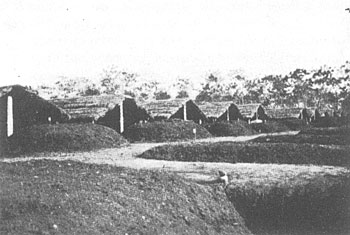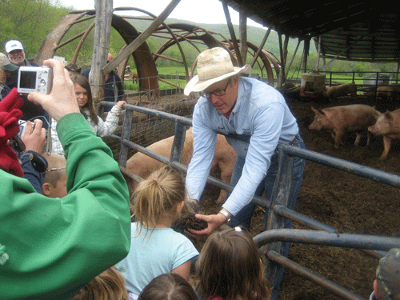
Agricultural history and sustainable systems
 The green revolution, peak
oil, sustainable building, and water stewardship formed the themes for
this week's selection of Folks,
This Ain't Normal.
I found the first to be the most interesting, with Salatin's history of
chemical fertilizers stemming from war-era scientific advances butting
up against Sir Albert Howard's studies of composting in India using
cheap manpower. If you're only going to read one chapter for
ideas and book recommendations, "The Poop, The Whole Poop, and Nothing
But the Poop" would be my top choice so far.
The green revolution, peak
oil, sustainable building, and water stewardship formed the themes for
this week's selection of Folks,
This Ain't Normal.
I found the first to be the most interesting, with Salatin's history of
chemical fertilizers stemming from war-era scientific advances butting
up against Sir Albert Howard's studies of composting in India using
cheap manpower. If you're only going to read one chapter for
ideas and book recommendations, "The Poop, The Whole Poop, and Nothing
But the Poop" would be my top choice so far.
 The other chapters suffered
more from Salatin's general inability to stay on topic and from his
wish to alienate everybody at least once during each essay. But I
did find his theories on both energy and water stewardship fascinating
--- Salatin posited that if we were personally involved in acquiring
energy and water and if systems were designed on small, local scales,
we'd have healthier environments and better societies.
The other chapters suffered
more from Salatin's general inability to stay on topic and from his
wish to alienate everybody at least once during each essay. But I
did find his theories on both energy and water stewardship fascinating
--- Salatin posited that if we were personally involved in acquiring
energy and water and if systems were designed on small, local scales,
we'd have healthier environments and better societies.
What jumped out at you
in this week's chapters? Feel free to head back to the first and second weeks' selections to comment
as well if your book recently showed up. And don't forget to read
chapters 14, 15, and 16 (up through "Scientific Mythology") for next
Wednesday. Thanks for reading along!
Want more in-depth information? Browse through our books.
Or explore more posts by date or by subject.
About us: Anna Hess and Mark Hamilton spent over a decade living self-sufficiently in the mountains of Virginia before moving north to start over from scratch in the foothills of Ohio. They've experimented with permaculture, no-till gardening, trailersteading, home-based microbusinesses and much more, writing about their adventures in both blogs and books.
Want to be notified when new comments are posted on this page? Click on the RSS button after you add a comment to subscribe to the comment feed, or simply check the box beside "email replies to me" while writing your comment.

Hi,
An interesting piece of history is Julius Hensel's Bread from stones. Basically German chemical producers killed his ground stone fertilizer business and tried to find and burn all copies of this book!
The book is an open pdf on the web and a very worthwhile read.
I have found granite meal / dust to be VERY effective fertilizer with some farmers I help.
John
Ultimately, nothing is truly sustanable, given the eventual "Heat Death of the Universe." When we harvest a crop, nutrients are carried away and deposited elsewhere eventualy. Those must be replaced to maintain fertility in the land.
The minerals are easily supplied from inorganic sources. The N is most difficult to supply. When manure is the source, you're really only transferring N from one field to another, and with it the potential for contamination by Salmonella, E.coli, etc. (all engineering solutions involve compromises.) Use of artifical, industrially produced N fertilizer avoids using up more fields (pasture) to obtain naturally produced N-fixation.
With modern ag techniques, yield is greatly enhanced, so loss of nutrients carried away by the harvestr is also increased, meaning greater fertilization rates are required to maintain fertility. If you wanna build more cars, you gotta buy more steel.
For hobbyists like me or self-sufficiency folks like you, squeezing every last corn kernel out of the field for the market is not important. For the pro farmer, it makes the difference for profitability and staying in business and feeding the world or of quitting and letting the masses starve.